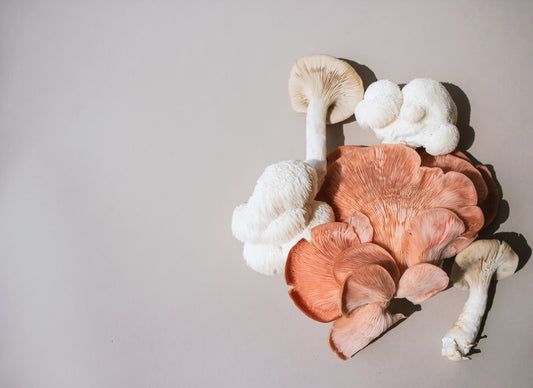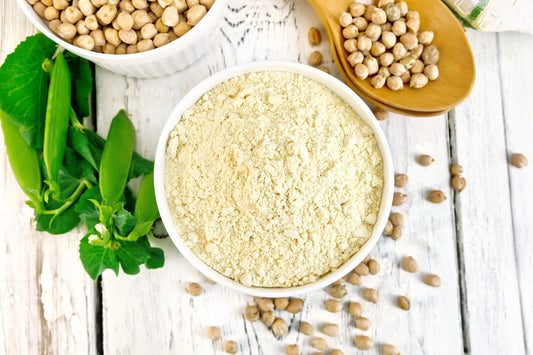Protein is an essential nutrient. Along with other macronutrients such as lipids and carbohydrates, it’s needed in significant quantities to sustain your body. Comprised of amino acids, protein is critical for building and repairing body tissues, transporting oxygen, and supporting a healthy immune system. Taking a protein powder supplement can also be an effective way to ensure you’re meeting your daily nutritional requirement.
Protein powders in particular are versatile dietary supplements, and a convenient way for athletes, bodybuilders, dieters, or anyone else to supplement their protein intake. They also function as a quick and nutritious on-the-go meal replacement when blended into a smoothie or a shake.
Whey protein powder comes from dairy cows and is made from a waste product of cheese production. It’s a complete protein source that contains all of the essential amino acids needed by the human body. Whey supports muscle protein synthesis because it’s easily digestible and quickly absorbed.
For various reasons, however, people may decide that a plant-based protein powder supplement works best for them instead. If you’d like to add a protein supplement to your diet, you may be wondering which is better: plant-based or whey protein powder. A quick look at their differences should help you decide which one is the better option for you and your lifestyle.
Plant-Based vs. Whey Protein Powder: How They Compare
When choosing between plant-based or whey protein powders, it’s necessary to consider their unique attributes to determine which one will best meet your personal needs.
|
Plant-Based Protein |
Whey Protein |
|
|
Source |
Seeds, beans, peas, or a combination |
Made from by-products of cheese production |
|
Vegan? |
Yes |
No |
|
Provides all 9 essential amino acids? |
Yes |
Yes |
|
Includes branched-chain amino acids (BCAA)? |
Yes |
Yes |
|
Digestibility |
Depends on the plant source |
Quickly digested and absorbed |
|
Allergenic? |
Some plant proteins are less allergenic than others |
Dairy allergies |
|
Environmental impact |
Sustainable; minor environmental impact |
Dairy farming has a greater environmental impact |
|
Shelf-stable? |
Yes |
Yes |
|
Additives |
May contain flavorings and natural or artificial sweeteners |
May contain flavorings and natural or artificial sweeteners |
It’s important to note that each type of protein has its own profile of specific amino acids in varying quantities. Regardless of the source, a powder containing protein isolate undergoes more processing. It will have a higher percentage of protein (at least 90%) vs. a concentrate (60-80%) which will contain more carbohydrates, fatty acids, and fiber. A protein hydrolysate has been treated with acids or enzymes to break down the proteins for quicker absorption.
Can Plant-Based Proteins Help Build Muscle Like Whey Protein?
If you’re a vegan or have a dairy allergy, it’s still possible to support your muscles with plant-based protein powder. With so many plant protein choices, however, it’s wise to extensively research your options. Below are three of the most popular plant-based proteins and how they compare to whey protein powder.
Pea Protein
Many nutritionists favor pea protein as a comparable alternative to whey since they have similar macronutrient profiles. Pea protein comes from nutrient-dense pulses. It’s high in both protein and fiber and contains B vitamins, iron, magnesium, zinc, potassium, and plenty of antioxidants. Pea protein powder mixes smoothly and is easily digested, supporting weight loss even without calorie restrictions due to its high fiber content. In one research study, pea protein was as effective as whey protein in promoting muscle building.
Soy Protein
Soy protein powder is made from soybeans. Besides its protein content, soy also provides folates, calcium, iron, magnesium, and fiber. Because it provides adequate amounts of all the essential amino acids, it’s commonly used as an alternative protein source for vegans and those with a dairy allergy. Soy is also a common allergen, however, and it may interfere with certain prescription medicines. We always recommend you speak with your healthcare provider before taking a new supplement or protein powder.
Hemp Protein
Hemp is a popular protein powder that provides all essential amino acids and has a profile similar to soy protein. Rich in fiber, it contains many nutrients including iron, magnesium, manganese, as well as omega-3 and omega-6 fatty acids. Like whey, hemp protein powder is made from a by-product of hemp seed oil production, making it a sustainable product. Though it is a good source of protein that is digested and absorbed slowly, it does not have the muscle-building capacity of whey protein.
So, Which is Better: Plant-Based or Whey Protein Powder?
If you’re interested in increasing your consumption of plant-based protein for health or environmental reasons, Om Mushroom has a new product just for you. This powder includes 21g of plant-based protein per serving and combines the muscle-building power of pea protein with the superfood benefits of our adaptogen powerhouse Master Blend.
Featuring ten functional mushroom species and adaptogens, the new Om Master Blend Plant Protein Powder comes in two delicious and nutritious flavors: creamy chocolate and vanilla. It’s a specially-curated blend that provides the bioactive benefits of these superfoods revered for thousands of years in Traditional Chinese Medicine. Available in chocolate and vanilla flavors, this versatile powder provides 21g of pea protein per serving when mixed into a smoothie or post-workout beverage. With daily use, it also also provides the adaptogenic and immune supporting power of functional mushrooms.‡
Plant-based proteins can offer real advantages for anyone who’s looking for a vegan protein option. For most people, these proteins are hypoallergenic and readily digestible, and in general their carbon footprint is just a fraction of that left behind by animal proteins. For a nutritious and sustainable protein powder that supports your wellness goals, check out what Om has to offer.
[CTA]
‡These statements have not been evaluated by the Food and Drug Administration. Functional mushroom products are not intended to diagnose, treat, cure or prevent any disease.













